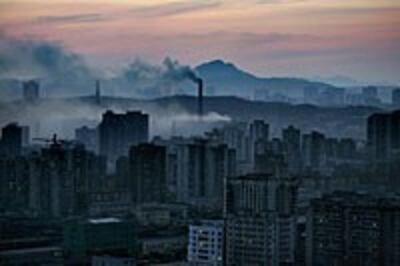
SEOUL—South Korea has said it will expand ties with the North in hopes that broader economic and agricultural aid might lure Pyongyang back to stalled talks on ending its nuclear weapons program.
The South Korean Unification Ministry said Thursday it would focus on the North's agriculture, a pilot industrial complex in the North Korean border town of Kaesong, civilian exchanges, and aid for young and elderly North Koreans.
South hopes to boost nuke talks
“We will manage the Korean situation in a stable manner through consistent inter-Korean exchanges and cooperation, seek resolution of North Korea's nuclear issue, and lay the groundwork for the development of inter-Korean relations as well as peace and prosperity of Northeast Asia," the ministry said in a report to President Roh Moo-hyun.
“We will be actively exercising our capability for a fundamental resolution of the nuclear problem,” the ministry said. South Korea already delivers economic and agricultural aid to North Korea.
Pyongyang, which declared itself Feb. 10 a nuclear state, recently halted the operation of a key nuclear reactor, raising fears that it might be extracting fissile material from spent fuel rods for use in atomic bombs.
For its part, Washington has acknowledged it may be considering tougher action against North Korea, such as referring its nuclear program to the U.N. Security Council for possible sanctions, if Pyongyang continues to boycott the talks.
Doubts over test plans
On April 29, South Korea also renewed its warning to North Korea not to conduct any nuclear tests, saying such a move will shaken the foundation of the six-way talks aimed at curbing the North's nuclear ambitions.
“North Korea must judge [the situation] cautiously,” Unification Minister Chung Dong-young told a news conference here. Chung cast doubt on suspicions that Pyongyang was preparing to test a nuclear bomb.
North Korea has long been suspected of possessing one or two nuclear bombs. However, some analysts say its nuclear arsenal could be significantly larger.
In Beijing on Wednesday, the lead U.S. negotiator for the North Korean nuclear talks told reporters the fate of the six-party process was in doubt.
Six-party talks in stalemate
“We continue to have a North Korean regime that is very ambivalent about whether it wants to find a negotiated settlement to this,” said Assistant Secretary of State Christopher Hill.
The two Koreas, the United States, Japan, China, and Russia met for three rounds of talks with no substantive progress. A fourth round planned for the latter part of 2004 never occurred.
Military tension remains high on the Korean peninsula more than 50 years after a truce ended the 1950-53 Korean War.
Original reporting by RFA's Korean service. Director: Jae-hoon Ahn. Produced for the Web in English by Sarah Jackson-Han and Luisetta Mudie.
